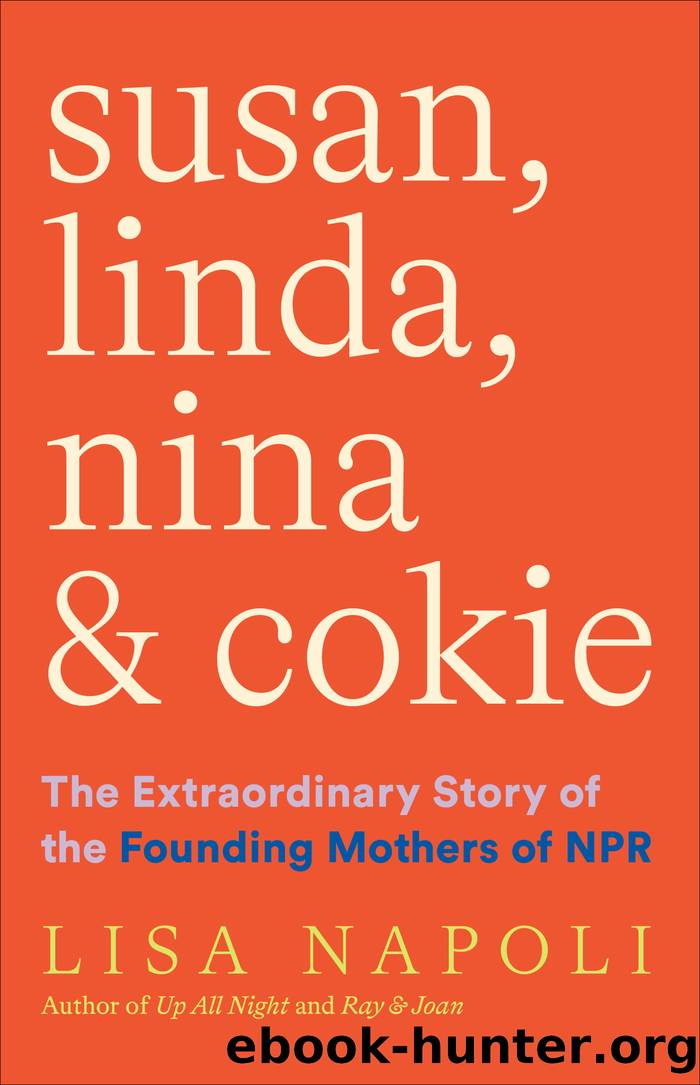Susan, Linda, Nina & Cokie by Lisa Napoli

Author:Lisa Napoli [Napoli, Lisa]
Language: eng
Format: epub
Published: 2021-04-13T00:00:00+00:00
* * *
As the leadership at NPR struggled to define the network, newly anointed producer Jack Mitchell tinkered to find the right sound for All Things Considered. National Public Radio was not CBS, and he knew the show heâd been entrusted to lead shouldnât aim to mimic it. There were enough bloviating men on the airwaves, that whole âvoice on the mountaintopâ sound of the networks. To build an audience, creating something different was key.
To Mitchell, the answer to his problem was right in front of him: Susan. It was despite, not because of, her sex that he chose her to be the cohost. What Mitchell was drawn to was Susanâs resemblance to the perfect diplomatâs wifeânot in the white glove, pinkie-finger-in-the-air-while-sipping-tea way, but because of her authentic and inherent interest in everyone she met. Yet the very qualities that excited him were exactly what unnerved both management and member stations. Mitchell pushed back on the pushback, all the while shielding Susan from it, not wishing to dash her confidence.
Susan herself had worried a bit about her âfunny, awful voice,â which was laced with the geographical marker of her native New York City, but she concluded that, like a beautiful face on TV, a voice was âjust whatâs up front; it doesnât do the job.â Indeed, it was her unique sensibility that did. Bill Siemeringâs mission statement had perfectly articulated what Susan believed radio should beâa celebration of human experience. She preferred to tell listeners the meaning of the news, not to merely recite the headlines; to explain how those headlines came to be and what their impact might be. It was nothing like conventional news, anywhere.
When the Apollo 17 crew landed on the moon, she interviewed a farmer in Ohio who believed it was a hoax. When TVâs Rhoda got married, Susan talked with a radical feminist about which honorific the fictitious new bride should use. When Squeaky Fromme took aim at President Ford, Susan spoke to filmmaker Robert Altman about an assassination scene in his 1975 movie Nashville. And when President Nixon began releasing transcripts of his Watergate tapes, Susan and the staff offered dramatic readings of them so listeners wouldnât have to wait to read them in the Sunday newspaper, the usual repository for such items of record.
Career politicians and their spokespeople, with their pat, predictable scripts, bored her. Similarly, she had no desire to speak with Hollywood celebrities. Artists, yes: performers, writers, composers, dancers, people who created the great works she loved to consume and that she assumed her listeners craved, too. Radio was a bridging device, a way to put people around the world in touch with one another, she said: âAll of us are part of a community that lives in a very confusing and difficult world, and we need to understand it together.â She considered it a joy, a gift, to jump into someoneâs life each day and to distill their ideas for others.
She adored radio for being the exact opposite of the
Download
This site does not store any files on its server. We only index and link to content provided by other sites. Please contact the content providers to delete copyright contents if any and email us, we'll remove relevant links or contents immediately.
Melania and Me by Stephanie Winston Wolkoff(880)
Live in Love by Lauren Akins & Mark Dagostino(829)
The Class of 83 by Hussain Zaidi(809)
Dancing in the Mosque by Homeira Qaderi(755)
A History of My Brief Body by Billy-Ray Belcourt(741)
Just as I Am by Cicely Tyson(603)
Stranger Care by Sarah Sentilles(603)
The Schoolgirl Strangler by Katherine Kovacic(579)
Unforgetting by Roberto Lovato(576)
Broken Horses by Brandi Carlile(572)
Berlin Diary: The Journal of a Foreign Correspondent 1934-41 by William L. Shirer & Gordon A. Craig(548)
Paris Without Her: A Memoir by Gregory Curtis(545)
Harriet Tubman: The Biography by University Press(542)
Robespierre: A Revolutionary Life by Peter McPhee(535)
1914 by Luciano Canfora(534)
Ariel (english and spanish Text) by Sylvia Plath(521)
One Life by Megan Rapinoe & Emma Brockes(519)
Black Mass by Dick Lehr & Gerard O'Neill(489)
Playboy Laughs by Farmer Patty;(481)
